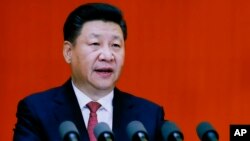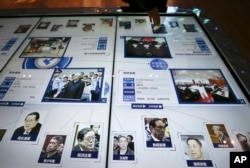At a closed door meeting of high-level Communist Party members this week, Chinese President Xi Jinping will make it clear his expansive anti-corruption drive is far from over and that controls will continue to tighten before a major political reorganization late next year.
But even as Xi tries to grow his influence over the party, his heavy-handed approach is sparking resistance, analysts note.
“Xi had a tremendous amount of things that he wanted to accomplish and the means through which he wanted to accomplish those was fairly draconian,” says Andrew Mertha, a political scientist at Cornell University. “It was really only a matter of time before there was some backlash.”
The opening of central committee plenum Monday, marks the beginning of a high season of political activity for China. The meeting will be brief and only last four days this week, but comes at the start of a political transition process that culminates late next year with the 19th Party Congress.
At that meeting, Xi will seek re-election and try to appoint his own people to the powerful Politiburo Standing Committee, a top decision making body that will replace five of its seven members next year. Xi Jinping and Chinese Premier Li Keqiang, a man that Xi does not always see eye to eye with, are expected to remain.
Zhang Lifan, a political commentator and historian says that while no one would dare to challenge Xi openly, soft resistance is not going away.
“The next year will be a challenging period for him and the key questions and things that he cares the most about are whether he can be successfully re-elected at the 19th Party Congress, and whether his authority as the core of the party can be consolidated so his clique can take over completely.”
Powerful leader
Xi is seen as one of China’s most powerful leaders since Mao Zedong and his assertive efforts to raise the country’s international profile, including the recent shift of allegiance by the Philippines to Beijing, has helped him win praise at home.
But he is also facing huge problems as well. Unlike his predecessors, he is navigating a political transition at a time when the economy is slowing for the first time in more than a quarter of a century. He has also had less time to groom his own proteges and build up his own power base, analysts say.
Many of the central committee members who are meeting this week are faction members of Xi’s predecessors, Hu Jintao and Jiang Zemin, notes Willy Lam, a veteran analyst of Chinese politics.
“They have been very much alarmed by the personality cult which Xi Jinping is building for himself and also the very aggressive power grab undertaken by Xi Jinping to aggregate more and more powers to himself,” Lam says, adding that efforts to enforce tougher rules during the meetings could invite a big pushback from members of both camps.
Since assuming control of the party in 2012, Xi Jinping has launched a crackdown on civil society, lawyers and the internet. He has issued regulations that prohibit party members from meeting alone or criticizing the party, and his expansive drive against graft has already seen more than one million party members punished for corruption.
In the run-up to this week’s meetings, state television broadcast a series on the anti-corruption crackdown that highlighted the extent of the campaign and praised Xi for his efforts.
The point of the series and its release so close to the meetings says David Zweig, a political scientist at Hong Kong University of Science and Technology is to send the public a message, to help people be emotionally and mentally prepared for the fact that people are behaving badly and the party will continue to nail them as it has been doing “at a pretty fast clip.”
“The message in general is for people to rally around him [Xi], for the next party congress or he can make just about everybody go on TV and eat humble pie,” Zweig says.
Soft resistance
Although the public in general has been supportive of efforts to tackle abuse of power and wanton waste of public funds, the drive has been so intense that many in local governments have been driven to “inaction.”
“What worries the central [government] the most is that the institutional government machine has slowed down on its operation or even stopped running,” Zhang says. “Many feel that no action leads to no mistakes or the more you do, there’s more wrong.”
And it is not just local governments, but moderate elites are also feeling the pressure and venting their discontent on social media.
In a recent article that was circulated widely online, well-known political scientist Jin Canrong, a professor at Renmin University noted what he called nationwide “soft resistance” to Xi’s policies and an increase in political tensions, which he says are showing no signs of going away and are having an impact on the economy.
“There are two engines to China’s economic rise, one is markets and the other is local governments. During the past 30 years, local governments have played a key role in economic development,” he wrote. Adding that “now it is clear that at least one of those engines has shut down.”






